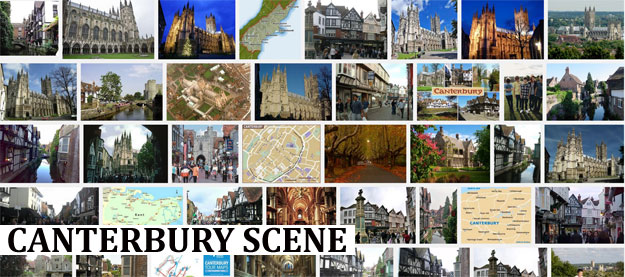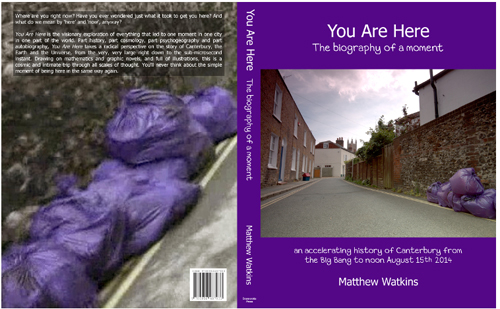
Ecole de Canterbury or not ? Question cruciale à laquelle je me garderai bien de répondre à la légère...
Les arguments sont depuis longtemps connus. On débat dans des forums spécialisés, on échange entre spécialistes, l'Université s'en mêle, c'est un sujet qui fait réfléchir...
Sur Calyx, les avis sont partagés : Richard Sinclair, Didier Malherbe y vont de leur explication, Hugh Hopper est plus réservé et Robert Wyatt plutôt sarcastique...
HH
"People say, what is the Canterbury scene? I think you have to come to Canterbury and see it and hear it ! I think Kent has got a particular sound. We've sung it in our schools here, we were all at school in this sort of area. I was part of the Church of England choir : up to the age of sixteen I was singing tonalities that are very English. Over the last three or four hundred years, and even earlier than that, some of the tonalities go back. So they are here, and they are a mixture of European things too. The history is very much that. A very historical centre of activity is Canterbury for the last hundred years. So it's quite an important stepping stone of whatever this thousand years have covered. I think it's not to be mocked because it's a centre of communication here and it's a meeting point - many nations come here to visit the cathedral, so you get a very unique situation happening".
"A lot goes on here, it's quite cosmopolitan, Canterbury, to a degree... But that's because of the tourists, not from the people who actually live here : they are very conservative, not cosmopolitan at all, not particularly worldly, I don't think. The music happens outside, gets written here and taken out. This is the Canterbury scene for me. It doesn't really exist here, but it forms here. Musicians, friends join together and play music together, and then they head off around Europe and play their music and get noted for this type of sound"...
RW
"I couldn't tell you much about that... I don't remember any particular movement happening there. I was at school there, I got married there and I lived there for a while. The school I went to had nothing special, there wasn't any particular interest for art, and I grew bored because I wasn't really good at school... If there ever was a Canterbury scene, it was when the Wilde Flowers became Caravan : they were Canterbury people...".
"I didn't even know it meant me until interviewers started asking me about it. As I say, because I'd bussed in from outside to go to school there I didn't really consider myself a Canterbury person. I think it really means people like Hugh Hopper and Richard Sinclair, who are genuinely based in that area. I met them there and I'm eternally grateful that I met someone like Hugh who provided something I don't think anyone else could have provided. My mind doesn't dwell on it as a place though, if I recall a former fantasy world upon which I draw, it's Harlem in the Forties and not Canterbury in the Fifties...".
Sur Whatsrattlin (Yahoo Group) la problématique est clairement posée Does Canterbury exist ? et la polémique va bon train... :
All think the Ramones are not Canterbury, but maybe there was one Ramone who pushed Robert's wheelchair and maybe this is the reason to declare the Ramones as part of the CS, why should it be not ok - you must not accept it, but it's no reason to start a war!
Halte au feu !
En 2002, un émérite universitaire de University of Surrey tente la synthèse avec le concept de Canterbury Sound :
Music, media and urban mythscapes: a study of the ‘Canterbury Sound’ !
In this article I examine how recent developments in media and technology
are both re-shaping conventional notions of the term ‘music scene’ and
giving rise to new perceptions among music fans of the relationship
between music and place. My empirical focus throughout the article is the‘Canterbury Sound’, a term originally coined by music journalists during
the late 1960s to describe the music of Canterbury1 jazz-rock group the
Wilde Flowers, and groups subsequently formed by individual members of
the Wilde Flowers – the most well known examples being Caravan,
Hatfield and the North and Soft Machine (see Frame, 1986: 16; Macan,
1997; Stump, 1997; Martin, 1998), and a number of other groups with
alleged Canterbury connections. Over the years a range of terms, for
example ‘Motown’, the ‘Philadelphia Sound’ and, more recently, the‘Seattle Sound’, have been used as a way of linking musical styles with
particular urban spaces. For the most part, however, these terms have
described active centres of production for music with a distinctive ‘sound’.
In contrast, however, in its original context the Canterbury Sound was a
rather more loosely applied term, the majority of groups and artists linked
with the Canterbury Sound being London-based and sharing little in the
way of a characteristic musical style. Since the mid-1990s, however, the
term ‘Canterbury Sound’ has acquired a very different currency as a new
generation of fans have constructed a discourse of Canterbury music that
attempts to define the latter as a distinctive ‘local’ sound with character-
istics shaped by musicians’ direct experience of life in the city of
Canterbury. A particularly significant aspect of this re-working of the
Canterbury Sound is the spatial relationship of fans both to the city and to
each other. Thus, the revived interest in the Canterbury Sound constitutes an essentially virtual scene, debates, discussions and definitions of the
Canterbury Sound being focused around fanzines, Internet newsletters and
websites via which a globally diffuse fan base communicates. In relation to
this virtual scene, Canterbury itself performs an important anchoring role as
myths surrounding the city are constructed online and worked into
discussions concerning the defining characteristics of the ‘Canterbury
Sound’..
|
Et en juillet 2018, Alan Stumpenhuson-Payne de University Of Kent tire enfin le bilan définitif
(en 256 pages) :
Popular Music in Canterbury betwwen 1965-1971
and Theories of Scene
This thesis examines the phenomenon and lasting influence of what has come to be known as the Canterbury Scene. It argues that the Canterbury music sceneis best understood through an investigation of the scale and diversity of live music in the city in the1960s, the nostalgia and interest it still evokes and the sense of popular music heritage which it contains. It adds to the relatively small body of literature about the Scene by examining academic and theoretical writing on the subject and using this andother paradigm examples to cast further light on the relationship between the music and its perceived location.My original contribution to knowledge is a detailed account of the state of musical performance and the performative features in Canterbury between 1965 and 1971, in particular. Through this, an assessment of the importance of the music to the canon of progressive rock may be made, and new insight gained into the extent to which the Canterbury of fifty years ago might be said to have been the locus of a scene or, at least, have given some support to a network of musicians -albeit musicians in bands with little economic co-dependency.The work draws on first-hand accounts of the music making of the time as well as local media accounts, fan magazines and online materials and attention is paid both to the translocal nature of the scene and musicians for whom Canterbury and East Kent remained the
geographical focus of the musical practices.
|
|
L'Histoire jugera.
The Canterbury Scene An Interview with Robert Wyatt - BBC South
|
Et pour ceux qui souhaitent épuiser les mystères de la Jérusalem de notre musique préférée, nous recommandons fortement la lecture de l'ouvrage You Are Here: The biography of a moment de Matthew Watkins. Une exploration kaléidoscopique de ce que Michel Butor a appelé Le Génie du Lieu, Canterbury en expansion, du big-bang au 15 août 2014 - centre du monde et mère nourricière des agencements sonores les plus enivrants que l'humanité a produit depuis son origine - Canterbury, ici, hier, maintenant et forever...
|


